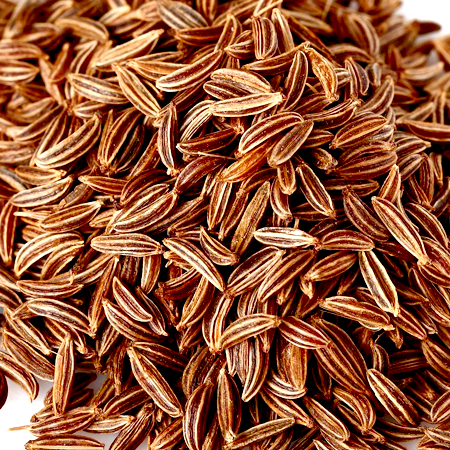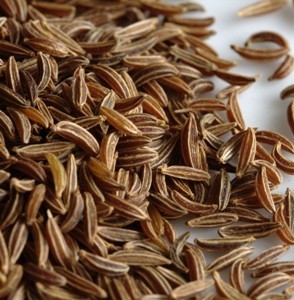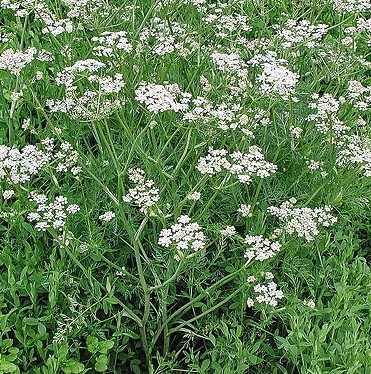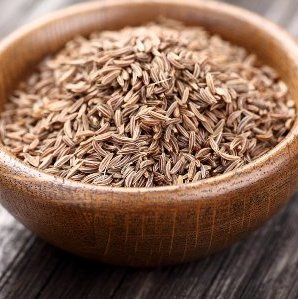




Botanical name Carum carvi L.
Family Apiaceae (Umbelliferae)
Source Seeds
Origin Egypt
Description / Color / Consistency A thin, clear, colourless to pale yellow liquid.
Aromatic Summary / Note / Strength of Aroma A middle note with a strong aroma, Caraway Essential Oil has a sweet spicy odor with a slight peppery smell.
Blends With Basil, Chamomile, Coriander, Frankincense, Ginger, Lavender, and Orange.
Product Abstract
Also known as Meadow Cumin, Caraway is a very old and well-known spice, used as far back as the Stone Age, according to the evidence found in archaeological digs. The Egyptians used it as flavouring in foods, the Romans in bread-making, and by the Middle Ages it had found popularity among the Germans and Austrians in their cooking as well.
History
English use of the term caraway dates back to at least 1440,and is considered by Walter William Skeat to be of Arabic origin, though Katzer believes the Arabic al-karawya (cf. Spanish alcaravea) to be derived from the Latin carum.
Harvesting/Extraction Information
The plant prefers warm, sunny locations and well-drained soil rich in organic matter. In warmer regions, it is planted in the winter as an annual. In temperate climates, it is planted as a summer annual or biennial.
Common Usage
Cautions
There are no inherent dangers to Caraway essential oil, except in some rare cases of irritation when a highly concentrated form was applied to the skin.
Key constituents
(þ)-Carvone 47.3–59.5%
(þ)-Limonene 36.9–48.8%
b-Myrcene 0.2–1.0%
Quality Caraway oil may be adulterated with synthetic carvone and limonene.
Safety summary
Hazards Skin sensitization if oxidized.
Cautions Old or oxidized oils should be avoided
Our safety advice We agree with the IFRA guideline of 1.2% for skin sensitization, but only for ()-carvone. Our dermal limit for (þ)-carvone is 23%, for toxicity. We recommend a human daily oral maximum dose of 12.5 mg/kg for carvone isomers. Therefore, caraway oil requires no restriction. Because of its limonene content, we recommend that oxidation of caraway oil is avoided by storage in a dark, airtight container in a refrigerator. The addition of an antioxidant to preparations containing it is recommended.
Regulatory guidelines Has GRAS status. The IFRA standard for either isomer of carvone in leave-on products such as body lotions is 1.2%, for skin sensitization. The Council of Europe has set an ADI of 1 mg/kg for carvone. This is equivalent to a daily adult dose of 100–135 mg of caraway oil. IFRA recommends that essential oils rich in limonene should only be used when the level of peroxides is kept to the lowest practical level, for instance by adding antioxidants at the time of production.
Organ-specific effects
Adverse skin reactions Undiluted caraway oil was irritating to rabbits, but was not irritating to mice or pigs; tested at 4% on 25 volunteers it was neither irritating nor sensitizing. Low-level phototoxic effects have been found for caraway oil, but these are not considered significant. Autoxidation products of (þ)-limonene can cause skin sensitization.
Systemic effects
Acute toxicity Caraway oil acute oral LD50 in rats 3.5 mL/kg; acute dermal LD50 in rabbits 1.78 g/kg. A 1-month-old rabbit was given 60 drops of caraway oil over a few minutes. It died after being seized with convulsions.
Carcinogenic/anticarcinogenic potential Whether supplemented in the diet or applied to the skin, caraway oil inhibited DMBA-induced and croton oil- induced skin tumors in female mice, and caused regression in established papillomas. Caraway oil significantly induced glutathione S-transferase activity in mouse tissues. Dietary caraway oil at 0.01% or 0.1% significantly inhibited the development of pre-malignant colon cancer lesions in rats, partly through maintaining a healthy level of hepatic glutathione and CYP1A1. (þ)-Carvone is not a rodent carcinogen, and both carvone and (þ)-limonene display anticarcinogenic activity.
Comments
Caraway oil capsules are used in the treatment of gastrointestinal complaints, often in conjunction with peppermint oil.